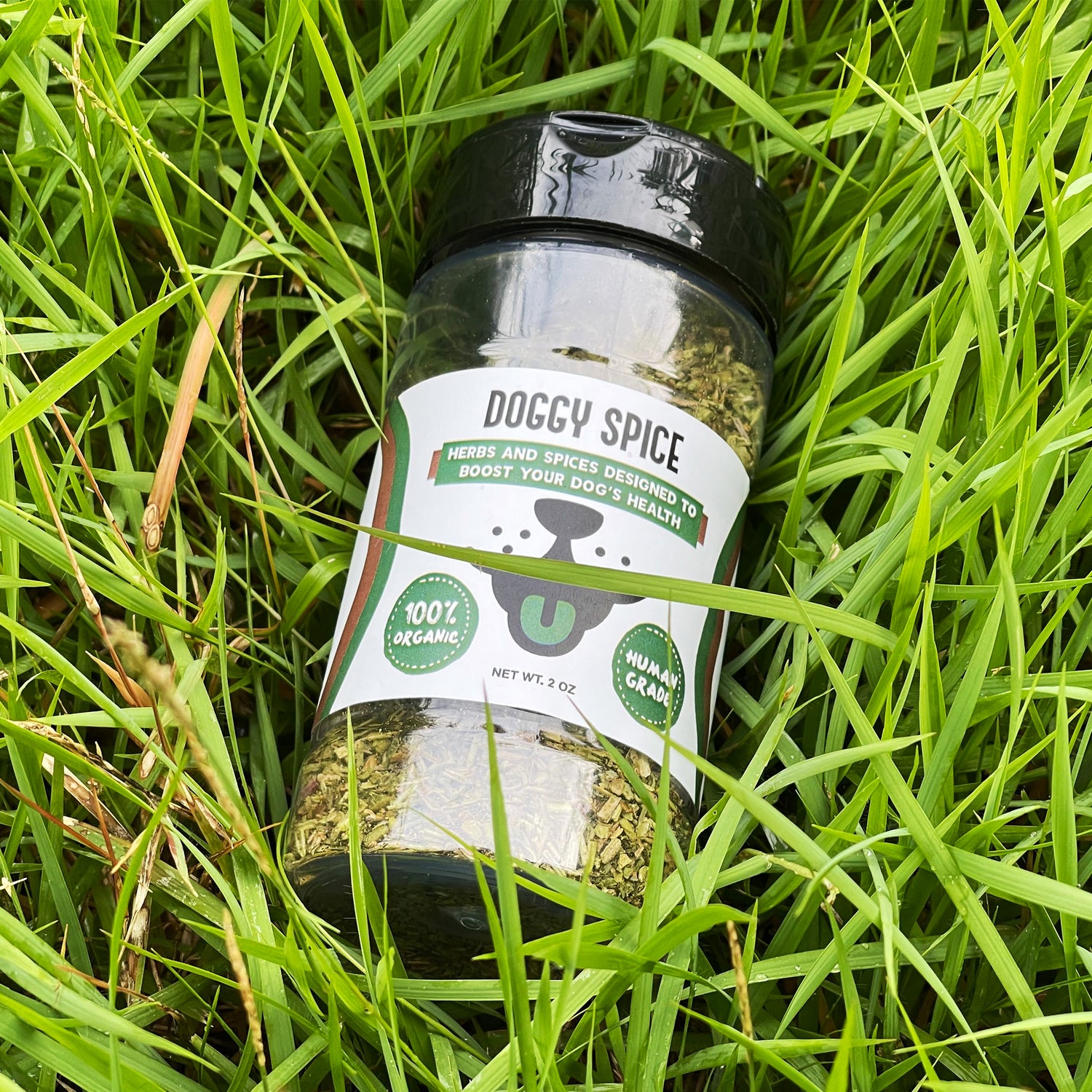
Can Dogs Eat Cinnamon? A Guide to Dog-Safe Spices and Herbs
Share
Introduction 🌿🐾
Knowing which spices are safe for dogs is essential for any pet owner who wants to explore natural ways to support their pet’s health. Spices like cinnamon, turmeric, and basil are often praised for their health benefits in humans, but can they safely be shared with our four-legged friends? This blog will answer the question, "Is cinnamon safe for dogs?" while also exploring other dog-safe spices and herbs that can support canine health, as well as spices that should be avoided.
Can Dogs Eat Cinnamon? 🐕🍂
Yes, dogs can have cinnamon in small amounts, and it may even offer health benefits like antioxidant support.
❗️However, cinnamon should be used in moderation, as excessive amounts can cause stomach irritation and other issues.
There are two main types of cinnamon:
- Ceylon cinnamon, also known as "true" cinnamon
- Cassia cinnamon, which has a higher coumarin content (a compound that can be harmful in large amounts).
✅ For dogs, Ceylon cinnamon is generally preferred.
❌ However, cinnamon essential oils are a different story. Due to their concentrated nature, cinnamon essential oils are considered toxic to dogs and should never be ingested or applied directly to their skin.
Benefits of Cinnamon for Dogs 🌿💪
Cinnamon’s appeal for dog health lies in its potential benefits when used appropriately. Let’s explore some of these perks:
✅ Anti-inflammatory Properties
Cinnamon contains antioxidants that can help reduce inflammation, which can benefit senior dogs or those with joint issues.
✅ Blood Sugar Regulation
Cinnamon has been studied for its potential to help regulate blood sugar levels, which could benefit dogs with specific dietary needs.
✅ Brain Health Support
Some research suggests that cinnamon’s antioxidants may help protect cognitive function, which can be helpful for aging dogs.
❗️While these benefits are promising, always remember that cinnamon is safe only in moderation—about 1/8 teaspoon for small dogs and up to 1/2 teaspoon for larger dogs is usually considered a safe range.
Other Dog-Safe Spices and Their Benefits 🐾🌱
Exploring safe spices for dogs can offer a variety of health benefits. Here are some other spices that can support your pup’s wellness when used mindfully:
Turmeric 🌿✨
Turmeric has gained popularity for its anti-inflammatory properties and its role in supporting joint health, thanks to the active ingredient, curcumin. It’s especially helpful for senior dogs who might be prone to arthritis or joint pain.
A small pinch of turmeric can be added to your dog’s food, and combining it with a healthy fat source (like a bit of olive oil) can improve absorption.
Basil 🌱❤️
Basil is a fragrant herb that can provide dogs with immune-boosting antioxidants. It’s also known to have calming properties and supports digestive health. Adding a small amount of fresh basil to your dog’s food occasionally can help boost their overall immune function.
Parsley 🍃🪥
Parsley isn’t just a garnish! It has benefits for dogs, including freshening their breath and supporting digestion. However, moderation is key; large amounts can cause upset stomachs.
❗️Italian (flat-leaf) parsley is safe in small amounts, but curly parsley should be avoided as it contains furanocoumarin, which can be toxic.
Spices to Avoid for Dogs ⚠️❌
While many spices are beneficial in small amounts, there are some that should be strictly avoided as they can be harmful or even toxic to dogs.
Nutmeg 💀🥥
Nutmeg contains myristicin, a compound that can lead to severe symptoms in dogs, including hallucinations and seizures. Avoid giving nutmeg or foods that contain it to your dog, even in small amounts.
Garlic 🧄🚫
Garlic may have health benefits for humans, but it’s toxic to dogs. Even small amounts of garlic can damage a dog’s red blood cells, leading to anemia. Avoid giving garlic to dogs, whether raw, powdered, or cooked.
Cocoa Powder 🍫❌
Cocoa powder is extremely toxic to dogs due to its high theobromine content. Unlike cinnamon or turmeric, cocoa powder can be fatal for dogs, so never share foods with chocolate or cocoa powder with your pet.
How to Introduce Spices to Your Dog’s Diet Safely 🌟🐶
Here are some general tips for introducing spices into your dog’s diet safely:
- Start Small: Always start with a tiny amount to see how your dog reacts. Monitor them for any adverse effects like stomach upset.
- Mix with Food: Add spices sparingly into your dog’s regular food to make the taste subtle. This can also help with digestion.
- Consult Your Vet: Before adding any new spice or supplement to your dog’s diet, it’s wise to consult with your veterinarian, especially if your dog has pre-existing health conditions.
Frequently Asked Questions About Spices for Dogs 🤔📖 (FAQ)
How much cinnamon is safe for my dog?
Small amounts are safe. Aim for 1/8 teaspoon for small dogs and up to 1/2 teaspoon for large dogs, mixed with food. Avoid cinnamon sticks and essential oils.
Are all spices dangerous for dogs?
No, many spices like cinnamon, turmeric, and parsley can be beneficial when used correctly. However, always check for safety and consult a vet.
What signs should I watch for if my dog eats a toxic spice?
Signs can include vomiting, diarrhea, lethargy, or seizures, depending on the spice. Contact your vet immediately if you suspect toxicity.
Can I give my dog spices daily?
Some spices, like turmeric, can be given in small daily doses, but it’s best to use them as supplements rather than daily staples.
What are some natural ways to add flavor to my dog’s food safely?
Besides spices, you can add flavor by including safe fruits like blueberries or vegetables like carrots. A sprinkle of dog-safe herbs like parsley can also be a great option.
Top Herbs and Spices to Keep Your Dog Healthy All Year 🌿
- Cleavers (Galium Aparine) - Supports lymphatic health
- Rosemary- Antioxidant-rich
- Dandelion Greens - Provides vitamins A, C, and K
- Basil - Calming properties
- Peppermint - Aids digestion
- Celery Seeds - Anti-inflammatory benefits
- Dill - Rich in antioxidants
- Oregano - Immune-supporting
- Parsley - Supports fresh breath
- Thyme - Immune booster
- Ginger - Soothes stomachs
- Tumeric - Anti-inflammatory properties
These herbs and spices can easily be incorporated into your dog’s meals with Doggy Spice to promote overall well-being. 🌱
Conclusion 🐕🍃
Incorporating dog-safe spices like cinnamon, turmeric, and parsley can enhance your pet's diet with natural benefits. Cinnamon, in particular, can provide anti-inflammatory and antioxidant support, but remember to use it sparingly. Always be cautious with the spices you share with your dog and avoid known toxins like nutmeg and garlic. With mindful choices and guidance from your vet, you can safely add a bit of spice to your dog’s life!
References
American Kennel Club (AKC). (n.d.). Dog safety and health: Feeding dogs human foods and spices. American Kennel Club. Retrieved from https://www.akc.org
PetMD. (n.d.). What foods and spices are safe for pets. PetMD. Retrieved from https://www.petmd.com
Whole Dog Journal. (n.d.). Using herbs and spices to support dog health: Safe amounts and benefits. Whole Dog Journal. Retrieved from https://www.whole-dog-journal.com
The Spruce Pets. (n.d.). Safe foods and spices for dogs: Toxic foods to avoid. The Spruce Pets. Retrieved from https://www.thesprucepets.com
American Veterinary Medical Association (AVMA). (n.d.). Toxic substances for dogs: Household spices and herbs. American Veterinary Medical Association. Retrieved from https://www.avma.org

